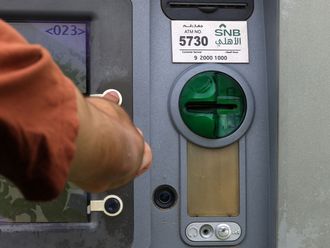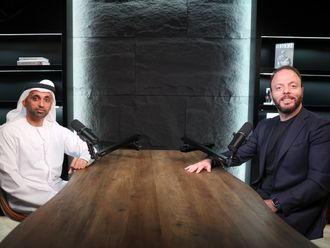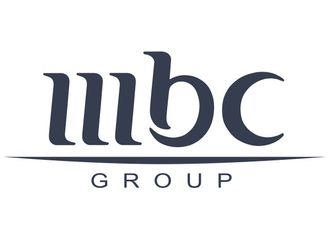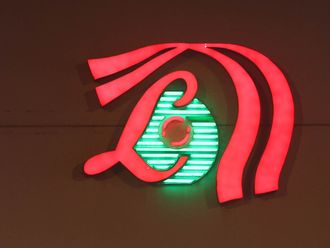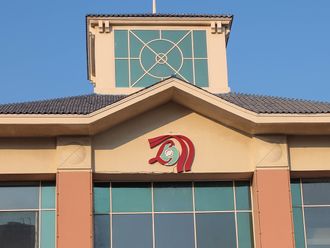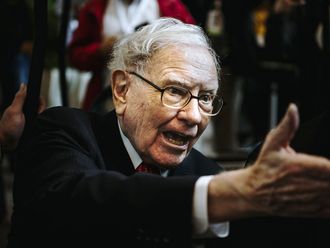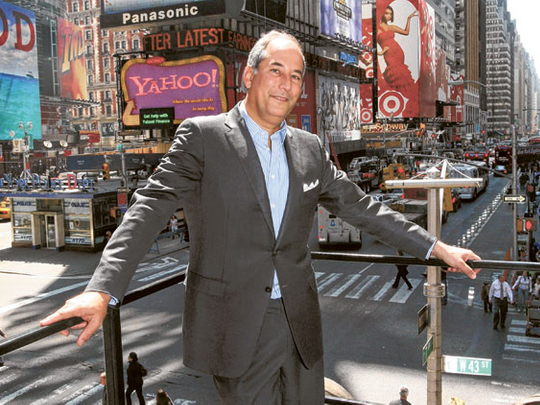
Dubai: Thomson Reuters CEO Tom Glocer has told Gulf News the company will expand the number of vertical industries in which it participates.
He said the multinational's focus on providing professional information and software services would be where the company will find new growth.
Thomson Reuters is a $13.1 billion (Dh48.12 billion) turnover group, of which the traditional Reuters news agency is only 5 per cent of turnover. But news remains an important part of the offering in the six professional areas the company covers: finance, health care, legal, media, scientific, and tax and accounting.
Giving an example of a new business area for Thomson Reuters, which also illustrates its global approach, Glocer said: "Last year we added an interesting carbon trading and energy service, Point Carbon. Even if carbon trading in the US has not yet taken off, there is more of a groundswell in Europe".
"We now have the leading content and software for capturing the both carbon pricing and other important factors, for whatever carbon trading regime is used, whether it is cap and trade or any other," he said.
Three years after the merger of the much smaller Reuters into the Thomson group, the new united company is achieving a better focus on where it plans to be. "We could do many things, but we have a clear sense of mission.
"Our core mission is to take content and software, and provide it to professionals as part of their work, to allow them to make better decisions faster," Glocer added.
Soft issues matter
"The merger went remarkably well because we worked so hard at it," he said. "Most people wrongly spend more time on the nuts and bolts of the physical aspects."
"But I think are the long term determinants of success are the softer cultural issues on which I spent most of my time. As a result the company really feels like one company."
"One of the reasons that the merger has gone well is because from the very beginning I was very clear that this was not a merger of equals. It was very clear that Thompson Corp which acquired Reuters and we renamed it Thompson Reuters.
"The constituent parts of the whole were Thompson two thirds, Reuters one third.
"This was only slightly confusing because I personally came from Reuters, where I was CEO, before I became CEO of the merged group. And we reversed Thompson Financial News into Reuters, so it looked as if Reuters acquired the Thompson Financial business. But for the group, the whole thing was very clear: it was an acquisition of Reuters by Thompson Corp."
The Thomson Reuters' focus on serving professional markets means that its prospects are more linked to the level of professionalisation in a given country or market, than its GDP. "If there are more scientists, wealth managers, doctors, lawyers, then the demand for our content and software is correspondingly higher," said Glocer.
"In the more rapidly developing parts of the world you are seeing quite a steep curve of rapid professionalisation. People are building legal systems. Think of all the new universities."
"So even if it has less than many countries in Asia in absolute terms, the GCC is significant in terms of rate of growth. In the Middle East our financial information services are still the fastest growing: in double-digits before the recession, and moving back towards double-digits now," he said.
"We have a very global view that our services are intended to go everywhere, but our legal services have to be more tied to the laws and languages of an area. So we have invested in that as a special regional or country service."
"We have just acquired the rights to the leading electronic collection of legal information in Saudi, Rashamoun."
"We are also significantly beefing up our Arabic news service. For many years we have offered Arabic language news to our media clients, but now we are adding Arabic news to our terminals, as those markets get larger. We are increasing people on that service, particularly aimed at the news services on the Arabic language financial terminals," he said.
"We have a very interesting new set of offerings in the field of governance, risk, and compliance. All the banking authorities around the world, ever since they saw how badly out of control the system got in 2008, have become ever more vigilant and passing ever more regulations. They want this kind of service," said Glocer.
Major divisions
One of Thomson Reuters' major divisions is servicing the scientific community. "We have a series of businesses which provide the content and software that scientists use as part of their innovation process," he explained.
"We run a service called the Web of Knowledge, in which if you want to know who is the most respected researcher working on any particular topic, you can get that from our service. It is essentially a network of abstracts of all of published scientific papers, combined with an indexed ranking of what fields are hot and what professionals are hot."
"It is sold primarily to universities and to companies in the scientific world. And with the large number of universities that have been created in the Gulf, whether it is the NYU in Abu Dhabi or the Cleveland Clinic, they subscribe to these kinds of services, so we have seen corresponding growth," he said.
"Tax and accounting may not set your heart racing, but our tax business is worth a billion dollars, said Glocer. "Our content and software service for tax and accounting deals with what the multinationals require, which has become so complex that human beings cannot do it without help from software".
"Providing news is integral to all of our services, even if the percentage of our revenues that come from the traditional Reuters news agency is well under 5 per cent of the total," Glocer said.
He was talking a few weeks after the tsunami in Japan, and pointed out that the terminal that sits on a portfolio manager's desk is being watched by the minute to see what is happening in Japan, as the value of the Japanese market tanked by 10 per cent and then went up by 5 per cent. "That is news flow," he said.
Tahrir reporting
Glocer was also very proud of the way Thomson Reuters kept broadcasting from Tahrir Square during the uprising in Egypt, despite President Hosni Mubarak's best efforts to stop them.
"Thompson Reuters kept broadcasting, despite government restrictions. We asked people not to credit where the TV was coming from. We were playing a bit of a cat and mouse game, as we used ever more inventive ways to keep broadcasting."
"There are a variety of ways that we got the digital signal out from more traditional satellites that are around, to more mobile solutions. We were experimenting on a daily basis."
"We were not commenting and not editorialising. We were broadcasting news."
Social media
Glocer is a keen advocate of using social media in the business environment, arguing that businesses must play with the technology and experience it, not just through reading a paper.
"We try to incorporate lots of the tools that first appear in a consumer format into our professional services: for example, offering a search that is very simple to use but very complicated in the back end that serves up just what people want."
Another example of social media in a Thompson Reuters platform is in its finance service, Eicon, "where there is the ability to share video clips of our insider television service, comment on it, and in effect run a professional blog in that environment."
Let the last word on social media go to Tom Glocer's personal blog, which he is proud of having written for more than seven years both as a way to formulate his ideas, and also so that he personally knows how new media works.
He blogged about his conversation with Al Hayat's Raghida Dergham at the Abu Dhabi Media Summit, in which he stated that access to the Internet was now a basic human right, pointing out that President Mubarak's clumsy attempt to shut it down only fanned the flames of the popular rebellion.
"However, over time, suppression of the internet will undermine the legitimacy of any government and sow the seeds of its downfall," he added.
"I also have the 160-year history of Reuters News as a guide.
"However, over the longer-term, by sticking to our convictions we have earned the trust of the societies in which we operate. So too the internet will triumph," he said.
"Not thanks to a single publisher, no matter how respected, but via the loud and competing voices of a multitude of self-publishers."
Profile: at a glance
- 2010 revenues of $13.1 billion were up 1 per cent (before currency conversion) from the previous year.
- Underlying operating profit margin was 19.6 per cent, which was a decline of 7 per cent due in part to investments in new product launches and acquisitions.
- Professional division revenues rose 4 per cent. Growth was good across each of Professional's business units, with Tax & Accounting and Healthcare & Science businesses achieving particularly strong results. Legal revenues were up 2 per cent, with 6 per cent growth from subscription services partially offset by declines in print and transaction revenues.
- Integration of the acquired Reuters financial and media businesses has gone very well and the restructuring programme will conclude this year.
New launches in 2010
Thomson Reuters launched new product platforms that embody what the company calls the Knowledge Effect. These included:
- WestlawNext, Reuters' next generation legal research platform;
- Eikon, a flagship financial information platform;
- Electron, an ultra-low latency infrastructure for electronic trading and data distribution;
- OneSource, a global tax workstation.
Acquisitions in 2010
Thomson Reuters invested approximately $900 million in acquisitions to support its growth initiatives including:
- Complinet, providing global compliance information solutions for financial services institutions and their advisors, to support a new Governance, Risk and Compliance business;
- Point Carbon, providing essential trading analytics, news and content for energy and environmental markets for a fast growing Commodities & Energy business;
- Serengeti, Pangea3, Canada Law Book and Revista dos Tribunais, extending the global footprint of a Legal business;
- GeneGo, providing biology and disease information, analytics and decision support solutions for pharmaceutical research and development to support a Life Sciences business;
- Aegisoft, bringing new electronic trading solutions and testing tools to a Sales and Trading business.




